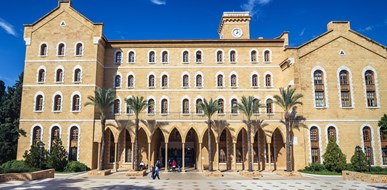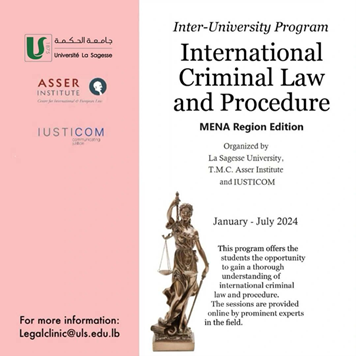Universities across the MENA region join the inter-university programme on international criminal law and procedure
Published 17 January 2024
@Shutterstock - The American University in Lebanon. More than 360 students from Lebanon and the Mena region have enrolled the Inter-University Programme on International Criminal Law and Procedure.
The Hague - Today, we launched the 13th edition of the Inter-University Programme on International Criminal Law and Procedure (IUP), organised by the T.M.C. Asser Instituut in collaboration with La Sagesse University in Lebanon and IUSTICOM. This year, the IUP has expanded across the Middle East and North Africa (MENA) region and is provided, free of charge, to more than 360 students from Lebanon, Palestine, Jordan, Egypt, Algeria and Iraq.
This unique programme offers students the opportunity to learn about international criminal law and procedure and the challenges of pursuing justice and accountability. The course was initially designed for Lebanese undergraduate and graduate students of law, political science and international relations and currently includes students from the following universities in Lebanon: American University of Beirut, Beirut Arab University, Islamic University of Lebanon, Lebanese American University, Lebanese University, Phoenicia University, La Sagesse University, and Holy Spirit University of Kaslik.
Given the ongoing conflicts and violations of international humanitarian and international criminal law, as well as the lack of accountability across the MENA region, we have expanded the IUP to include students from Birzeit University and An-Najah National University in Palestine, the University of Jordan, Ain Chams University in Cairo, Egypt, Ghardaia University in Algeria, and the University of Baghdad in Iraq.
The programme covers a wide range of topics, including transitional justice, international humanitarian and criminal law, Sharia law and international criminal proceedings, and teaches students about core international crimes (genocide, crimes against humanity, war crimes and terrorism), modes of liability, the rights of the accused and the role of victims. Prominent academics and practitioners deliver the lectures in English or French with simultaneous interpretation into Arabic.
Fostering cross-cultural understanding
An IUP alumnus stated: "This programme is the first of its kind in Lebanon and the Middle East. It has introduced me to respectful professors and judges who have helped me to explore the real world of justice." Professor Georges Masse of the American University of Science and Technology in Beirut referred to the programme as "the best attempt towards reconciliation in Lebanon, because it brings together universities and students from different backgrounds." And professor Reina Sfeir of La Sagesse University added that “the MENA region is in dire need of Arabic-speaking experts in international criminal law. Thanks to the IUP many students are specialising in ICL, some started working in the field of international criminal justice, while others are publishing international criminal law books in Arabic and thus contributing to its promotion in the MENA region”.
The Asser Institute’s acting academic director and chairperson of the executive board Christophe Paulussen has coordinated the programme on behalf of Asser Institute since the outset. He stated that “the IUP is an important initiative which promotes international criminal law education and awareness in Lebanon and the MENA region. It is also playing a role in fostering cross-cultural understanding and dialogue and has led to international criminal law becoming an integral part of the Lebanese students’ legal vocabulary. We are grateful to all of the students, professors, and partners who have made the IUP possible. I am very happy that the IUP’s impact is expanding now that students from other universities in the MENA region are joining as well. We look forward to continuing to offer this valuable programme in the years to come.”
IUSTICOM’s founding director and initial architect of the programme Olga Kavran is thrilled to see the programme expand and hopes “that the growing number of expert voices from the MENA region and their increasing involvement in debates on the topics on international criminal law and international criminal justice will enrich the field and make it far more accessible and equitable, particularly among increasing (and justified) criticisms from the ‘Global South’”.
Background
The project was set up in 2011 by the T.M.C. Asser Instituut and the Outreach and Legacy Section of the Special Tribunal for Lebanon (STL). At that time, there was no specialisation in international criminal law offered at any Lebanese university, so the IUP was the first of its kind and unprecedented in the Middle East and North Africa region. From the start, the lectures were streamed online from the Asser Institute to lecture halls in the participating universities in Lebanon. As this happened in pre-pandemic times, an online course was very innovative. Since then, inspired by the IUP, both the International Criminal Court and the International Residual Mechanism for Criminal Tribunals (the residual mechanism of the ICTY and the ICTR) have implemented similar programmes.
Following the withdrawal of the STL in 2020, the programme continued to be implemented by the Asser Institute and the International and Transitional Justice Resource Center (ITJRC). In 2022, La Sagesse University, the International Center for Human Sciences CISH – UNESCO, and IUSTICOM joined as consortium partners. Since 2023, the programme has been run by the Asser Institute, the Human Rights Legal Clinic at La Sagesse University and IUSTICOM in cooperation with 14 universities across the MENA region. More than 2,000 students have graduated to date.

